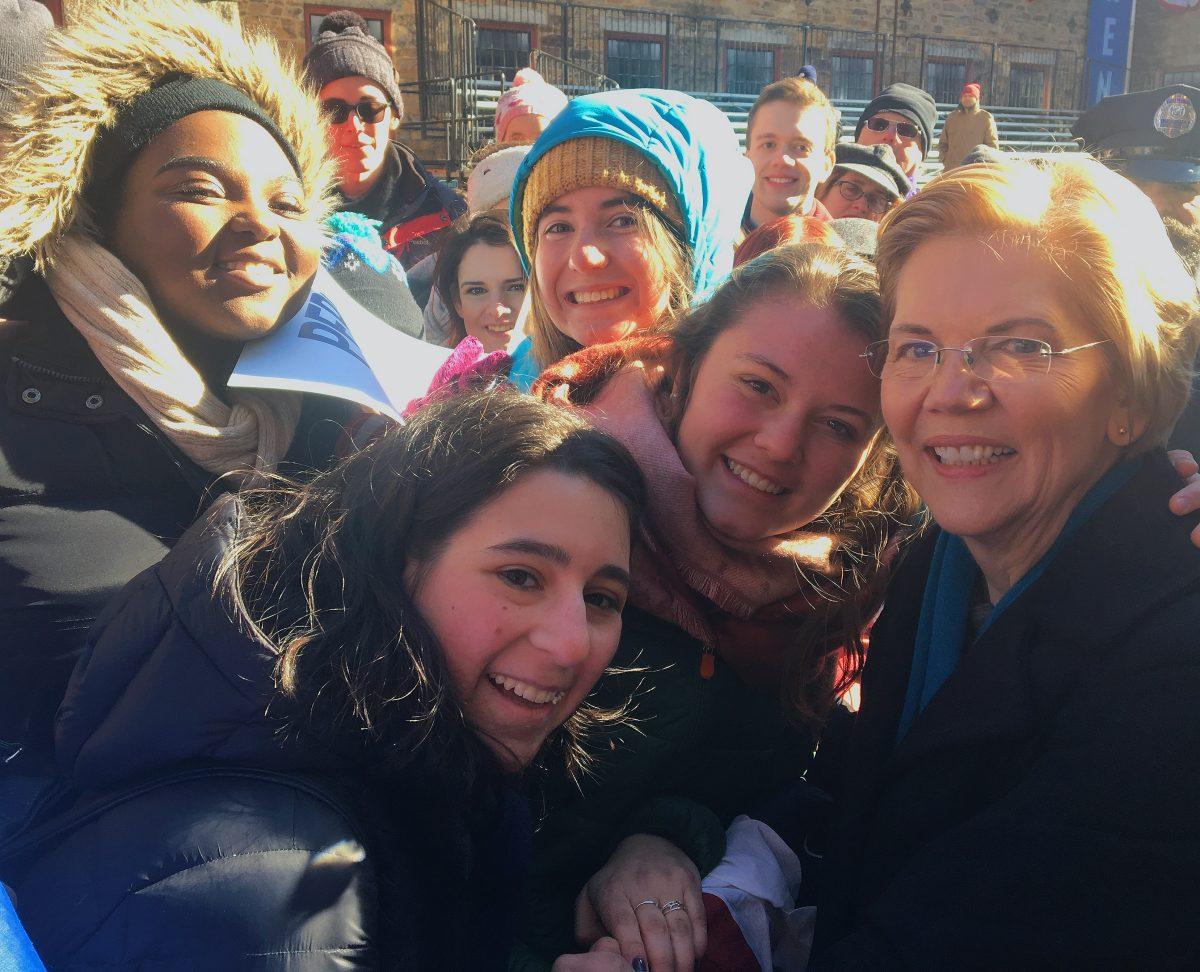On February. 9, Senator Elizabeth Warren stood in front of an energetic crowd in Lawrence, MA and formally launched her presidential campaign.
“This is the fight of our lives,” Warren said in her announcement. “The fight to build an America where dreams are possible, an America that works for everyone.”
Sarah White ’19 was one of the many Wellesley students who made the hour long trip to Lawrence to watch as Elizabeth Warren began her fight for the presidency. The senior English major shared that she attended the announcement because “I’ve always liked Elizabeth Warren and thought I might be seeing history in action.” White added that she hopes to work for Warren’s campaign team after she graduates from Wellesley in May.
Feb. 9 was not the first time White or other Wellesley students saw Warren deliver a live speech. In September 2016, the senator attended and spoke at Wellesley President Paula Johnson’s inauguration. In the speech, Warren declared her respect for the college, President Johnson and Hillary Clinton, the alum who was then “on the cusp of shattering the highest glass ceiling of all.”
In spite of her history with Wellesley College, student support for Elizabeth Warren has wavered in the past year. The senator made national headlines in October after she released a DNA test in order to prove her Native-American ancestry. Warren’s decision to share the test results came after President Trump and several other members of the Republican Party accused the senator of falsely claiming to be Native American in order to advance her career as a Harvard law professor and a politician. The DNA test ultimately confirmed that Elizabeth Warren has some Native-American ancestry. However, members of the Cherokee Nation publicly criticized her for claiming a connection to their tribe, and argued that belonging to a community is about more than just genetics.
Cherokee Nation Secretary of State Chuck Hoskin Jr. said in a statement to CNBC, “Using a DNA test to lay claim to any connection to the Cherokee Nation or any tribal nation, even vaguely, is inappropriate and wrong. Senator Warren is undermining tribal interests with her continued claims of tribal heritage.”
The day after Elizabeth Warren released her DNA results, the controversy spread to Wellesley. The Wellesley College Democrats (WC Dems) sent a school-wide email announcing the organization’s decision to cancel a canvassing trip for Warren’s senatorial campaign. The email read in part, “Elizabeth Warren’s recent actions regarding the release of her DNA report do not align with our ideals as an organization; we do not condone this act of cultural appropriation and have therefore taken the decision to change our canvassing schedule.”
Kisha James ’21, the president of the Wellesley Native American Association, shared in a written statement to the Wellesley News that she wholeheartedly agreed with the WC Dems’ decision to cancel the canvassing trip for Elizabeth Warren. She stated, “One of the things I’ve noticed from this whole DNA debacle is that people are acting like we can’t criticize Elizabeth Warren because she might defeat Trump in the next presidential election or because there are bigger issues at hand. To be clear, there are not bigger issues at hand for Native Americans.”
With regards to Warren’s presidential campaign, James urges Wellesley students to “vote for whoever you want in the 2020 elections, but stop giving Warren a free pass. Hold her accountable for the role she has played in all of this.”
Shannon Dennehy ’19 was another one of the Wellesley students who attended Warren’s campaign announcement in Lawrence. Dennehy attended the announcement because she agrees with Warren’s economic policies and appreciates her commitment to the working and middle class. However, she has not yet decided which of the Democratic candidates she will back in 2020.
Dennehy feels that Wellesley students should consider the DNA controversy when determining who to vote for in 2020. “I think students should definitely consider the controversy,” Dennehy said in a written statement to the Wellesley News. “That action and her statements made it clear that, though she has no cultural ties to the Native American community, she continued to push the narrative. That’s a problem.”
Though she had not yet decided whether she will support Elizabeth Warren in 2020, Dennehy is glad she had the opportunity to attend the campaign announcement; “Regardless of who I vote for or the outcome of the election, it was an historic moment; this is a new era in politics and every woman who is running is reshaping the field,” she said.






